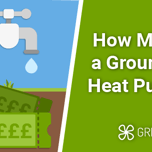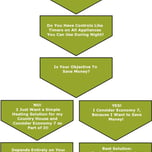Answer these simple questions and we will find you the BEST prices
Which type of solar quotes do you need?
It only takes 30 seconds
100% free with no obligation

Get up to 4 quotes by filling in only 1 quick form

Install a heat pump for less with the BUS grant

We’ve helped over 500,000 homeowners reduce their carbon footprint
- GreenMatch
- Compare
- types
- Boilers vs Heat Pumps
Heat Pump VS Gas Boiler Comparison in the UK (2025)

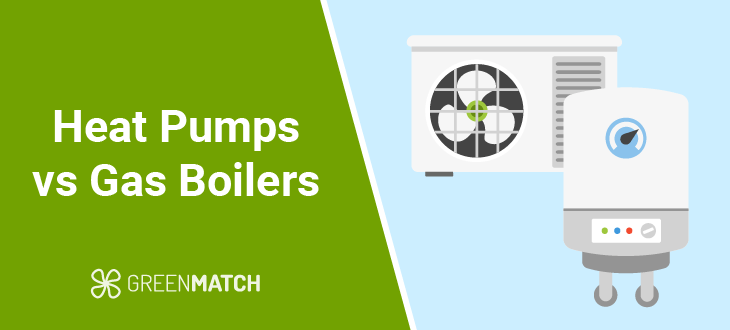
- Heat pumps can cut down on your home’s annual energy expenses and reduce your carbon footprint.
- A gas boiler is one of the cheapest home heating solutions in the UK today.
- A heat pump is a better option than a gas boiler because it operates efficiently, can be used for heating as well as cooling purposes, and produces fewer carbon emissions as they operate - making it both cheaper and more environmentally-friendly.
Most homes in the UK use gas boilers for heating, but that doesn’t necessarily mean that it’s the best option for you. In this article, we discuss the features of a heat pump vs a gas boiler to give you an idea of how a different energy system can benefit your home.
Overall, heat pumps are a better choice than a gas boiler if you’re looking to reduce your carbon footprint and benefit from the latest update to the Boiler Upgrade Scheme. That said, installing a heat pump for your home can be quite the expense. To ensure that you’re not overspending on upgrading your heating system, you will want to compare prices across several installers.
Instead of wasting hours or even days on tedious research, let us put you in touch with up to 4 local heat pump installers from our network of vetted specialists. All you need to do is fill in our 30-second form and sit back and relax while the installers reach out to you with free, non-binding heat pump quotes. Simply click below to get started now!
- Quotes from local engineers
- Payment by finance available
- Save £7,500 with BUS grant
It only takes 30 seconds



- Gas boilers vs heat pumps
- The installation process compared
- Purchase costs compared
- Running costs compared
- Grants compared
- Performance compared
- Efficiency compared
- Dimensions compared
- Environmental impact compared
- Can I get a heat pump for my home?
- The verdict: What is the best choice for you?
- Frequently asked questions
Gas boilers vs heat pumps
While both gas boilers and heat pumps can be used for heating purposes, there are some key differences between these two systems. The main distinctions have to do with the environmental impact of these systems, as well as their yearly running costs. Take a look below to find out more about heat pumps vs gas boilers:
| Specifications | Gas Boilers | Heat Pumps |
|---|---|---|
| Type of energy provided | Heating | Heating and cooling |
| Power output range | 24 - 40kW | 2 - 16kW |
| Efficiency | Up to 95% | Up to 400% |
| Carbon emissions | 2,500kg | 850kg |
| Supply costs | £500 - £3,500 | £2,400 - £19,000 |
| Annual running costs | £680 - £1,600 | £550 - £1,100 |
The installation process compared
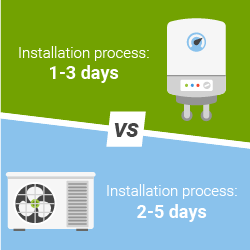
When it comes to the installation process of a gas boiler vs a heat pump, a gas boiler installation is more disruptive than a heat pump installation. However, a heat pump can take somewhat longer to install, depending on the kind of heat pump you choose.
If you’re installing an air source heat pump or a ground source heat pump, the process can take between 2-5 days. An air source heat pump installation is much easier than installing a ground source heat pump, so the complexity and duration of the process will vary significantly depending on which system you opt for.
While 2-5 days may seem like a long time, it’s important to note that the comfort of your home will not be affected greatly. This is because the majority of the heat pump installation occurs outside.
Installing a gas boiler, on the other hand, comes with quite some disruptions. Depending on the complexity of the installation and on whether you’re having a combi, system, or conventional boiler fitted, the process can take anywhere from 1 to 3 days. During this time, the installer will be working inside your home and the process can be quite noisy and disruptive.
So, if you’re debating between a heat pump or a gas boiler, it’s worth factoring in the installation process. Overall, a heat pump installation is smoother than that of a gas boiler and it will have less of an impact on the comfort of your home.
Purchase costs compared
If you’re wondering: “Is a heat pump cheaper than a gas boiler?” then the answer is no. Heat pump costs can range anywhere from £2,400 to £19,000.
This range may seem significant, so let’s break it down. For a 2 - 3 bedroom home, you’d pay around £4,000 - £6,500 for an air to air heat pump and about £11,500 for an air to water heat pump. A ground source heat for this home size costs around £14,850.
Gas boiler prices, on the other hand, range from £500 to £3,500. For a 2 - 3 bedroom home, you could spend somewhere between £800 and £1,200 on a gas boiler. Combi boilers are the cheapest option, whereas system and conventional boilers cost more. Still, when it comes to gas boiler vs heat pump costs, gas boilers are a more cost-effective option. That said, they are a less environmentally friendly one.
Below, you can find out more about the costs of the different types of heat pumps and gas boilers:
| Type of Energy System | Estimated Purchase Cost | Estimated Installation Cost | Estimated Total Cost |
|---|---|---|---|
| Combi boiler | £500 - £3,000 | £1,000 - £1,500 | £1,500 - £4,500 |
| System boiler | £580 - £3,500 | £1,000 - £1,500 | £1,580 - £5,000 |
| Conventional boiler | £600 - £3,500 | £1,000 - £1,500 | £1,600 - £1,500 |
| Air to air heat pump | £2,400 - £8,800 | £350 - £1,700 | £2,750 - £10,500 |
| Air to water heat pump | £8,400 - £12,350 | £350 - £1,700 | £8,750 - £14,050 |
| Ground source heat pump | £13,200 - £19,000 | £3,000 - £20,000 | £16,200 - £49,000 |
As you can see, when it comes to the cost of a heat pump vs a gas boiler, the latter is the cheaper choice, both in terms of purchase and installation costs.
However, it’s important to consider that while a gas boiler can attend to your home’s heating needs at a lower cost, a heat pump can be used for both heating and cooling purposes.
So, instead of relying on a gas boiler in the winter and an AC unit in the summer, you can also consider installing a heat pump that can address your energy demands year-round.
No clue which option would be the best for your home? Then, you’ll want to get in touch with an installer you can trust to offer you the best tailored advice. Finding a reliable professional on your own can take hours of tedious research, with no guarantee that you will end up finding what you were looking for.
Thankfully, we’re here to help you skip the hassle. All you have to do is fill in our 30-second form and we’ll connect you with up to 4 local installers who can offer you free, no-obligation quotes for their services. Then, just compare installers to find the one you want to work with and secure the best deal for your home. Simply click below to get started today!
- Quotes from local engineers
- Payment by finance available
- Save £7,500 with BUS grant
It only takes 30 seconds



Running costs compared
If you want to know what the heat pump vs gas boiler running cost is in the UK, you will have to consider your home’s energy demands, as this indicates how much you’ll need to run your heating system.
Below, you can find an overview of the annual running costs of gas boilers vs heat pumps:
| Household Size | Estimated Annual Energy Demand | Estimated Annual Running Costs of Gas Boilers | Estimated Annual Running Costs of Air Source Heat Pumps | Estimated Annual Running Costs of Ground Source Heat Pumps |
|---|---|---|---|---|
| 1 bedroom | 8,000 kWh | £620 | £740 | £680 |
| 2-3 bedrooms | 12,000 kWh | £890 | £1,020 | £920 |
| 4+ bedrooms | 17,000 kWh | £1,260 | £1,400 | £1,250 |
It is important to keep in mind that exactly how much you’ll end up spending yearly to run your gas boiler or heat pump will depend on how efficient your system is. The estimates above are for highly-efficient appliances (A-rated boilers and heat pumps with a Coefficient of Performance of 3.5 and 4). The more efficient your system, the higher the annual savings when it comes to running costs.
At the same time, you can lower the running costs of a heat pump even more by pairing your system with solar panels. By using solar energy to run your heat pump, you can reduce your reliance on the electricity grid and bypass fluctuating electricity costs.
So, while heat pumps are more expensive in terms of supply and installation, they can offer long-term savings, as they have lower running costs than gas boilers.
Grants compared
As we’ve discussed in this guide, neither gas boilers nor heat pumps come cheap. Thankfully, there are currently several government boiler grants or heat pump grants you can apply for to lessen the financial burden of upgrading your energy system.
You can find out more about the grants for heat pumps vs gas boilers below:
| Heat Pump Grants | Gas Boiler Grants | ||
|---|---|---|---|
| Grant | Potential Savings | Grant | Potential Savings |
| Energy Company Obligation Scheme (ECO4) | £7,000 - £20,000 | Energy Company Obligation Scheme (ECO4) | Partially or fully funded boiler upgrade |
| Warmer Homes Scotland | Up to £10,000 | Warmer Homes Scotland | Up to £10,000 |
| Northern Ireland Sustainable Energy Programme | Partially or fully funded air source heat pump installation | Northern Ireland Sustainable Energy Programme | Partially or fully funded air source heat pump installation |
| Boiler Upgrade Scheme (BUS) | Up to £7,500 | Affordable Warmth Scheme Northern Ireland | Up to £7,500 |
| Home Energy Scotland Scheme | Up to £15,000 | ||
| Warm Homes Programme Wales | Partially or fully funded heat pump installation | ||
| 0% VAT | Up to £2,450 | ||
As you can see, more grants are available for heat pump installations than gas boiler upgrades. The UK government is working to incentivise homeowners to choose renewable energy sources rather than systems that run on fossil fuels.
Before applying for any of these grants, make sure to check that you meet their eligibility criteria. Some of them have income requirements, while others are only available in certain locations. If you’re unsure how to apply for one of these grants, you can consult an installer who can help answer your questions.
Performance compared
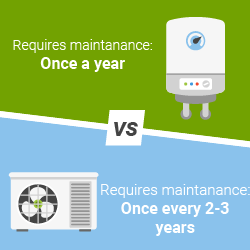
When it comes to the performance of a heat pump vs a gas boiler, the main factor you will want to consider is the lifespan of each of these appliances.
Boilers typically have a lifespan of around 10-15 years. Heat pumps are expected to last just as long. The difference between heat pumps and gas boilers in terms of performance lies in how often they require maintenance. Ideally, gas boilers require yearly maintenance, whereas heat pumps only need to be checked once every 2-3 years. Make sure to consult a specialist about the kind of care and maintenance your system requires.
Another aspect to consider when comparing the performance of heat pumps and gas boilers are the conditions in which they can operate efficiently. In the UK, both energy systems can function well.
However, in some cases, adverse weather conditions can affect the performance of heat pumps. This is particularly true for air source heat pumps, which tend to operate less well in colder climates. In the UK, this is generally not a huge issue, as winters don’t reach really low temperatures that would affect the performance of your heat pump.
Overall, both gas boilers and heat pumps boast high performance levels and can attend to the energy needs of households in the UK year-round. That said, heat pumps do require additional considerations, as they require proper home insulation to operate effectively and may involve radiator upgrades as well.
Efficiency compared
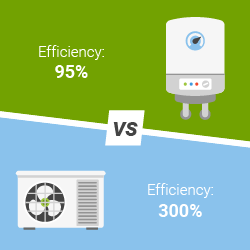
Generally speaking, the efficiency of a gas boiler is around 95%, whereas that of a heat pump is 300%. This means that for each unit of electricity heat pumps consume, they generate 3 units of usable energy, while gas boilers produce less than 1 unit of energy for each unit of fuel.
This difference can have a significant impact on your energy bills with a heat pump vs a gas boiler, as well as on your carbon footprint. Aside from the fact that they involve fewer fossil fuels in their operation process, the efficiency of heat pumps allows you to minimise your electricity consumption, and, as a result, lower your carbon emissions and, in some cases, your running costs.
How energy efficiency is measured is different for gas boilers compared to heat pumps. Boilers have ratings ranging from G (indicating the lowest efficiency of around 70%) to A+++ (showing the highest efficiency, namely about 150%). Today, most gas boilers are also condensing boilers, which means that they have an efficiency of 92% or higher. As a result, less fuel is wasted in the process of generating heat.
Heat pump efficiency, on the other hand, is measured through the Coefficient of Performance (CoP). This can range from 1.5 to 4.5 and varies depending on the type of heat pump you opt for. As an estimate, air source heat pumps have a CoP of up to 3.5, whereas the CoP of ground source heat pumps can be up to 4.5.
Dimensions compared
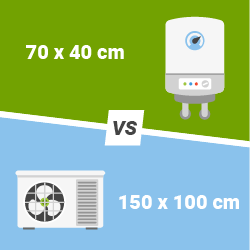
When you’re debating whether you should get a boiler or a heat pump, one of the things you’ll need to consider is the amount of space they take up. This way, you can be sure that your energy system will fit within the available space you have at home.
When it comes to gas boilers, a combi boiler unit has dimensions of about 70 centimetres high and 40 centimetres wide. This means that you may be able to fit a combi boiler in a kitchen cupboard or utility closet. System or conventional boilers require additional components such as a water storage tank and a hot water cylinder, which will take up more space in your home and they are often installed in the loft.
Air source heat pump units are somewhat larger, as they are around 100 - 150 centimetres high and 50 - 100 centimetres wide. That said, these units are typically mounted on a wall outside of your home, so they shouldn’t affect the space you have in your home.
Ground source heat pumps require the most space, which is why they may not be suitable for all households. While the heat pump unit itself is comparable in size to an air source heat pump’s dimensions, it requires about 600 to 1,200 square metres of space in the ground for a horizontal installation.
Environmental impact compared
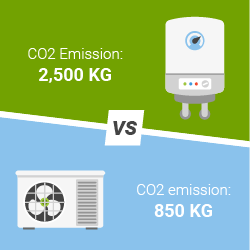
Considering the carbon emissions of a heat pump vs a gas boiler is crucial if you’re aiming to make your home more environmentally friendly. Overall, heat pumps have a lower environmental impact than gas boilers.
Gas boilers rely on fossil fuels to operate and emit an average of about 2,500kg of CO2 per year. Other types of boilers, such as biomass boilers, wood pellet boilers, or electric boilers, have a lower carbon footprint than gas. If you are still interested in a boiler, it may be worth considering one of these options to minimise your home’s environmental impact.
In comparison, the estimated annual CO2 emissions of heat pumps are around 850kg. So, if environmental impact is a priority to you, heat pumps are hands down a better option compared to a gas boiler.
If you’re ready to reduce your home’s carbon footprint by installing a heat pump, the next step is to find a reliable installer to work with. In many cases, this is easier said than done. After hours of gruelling research, you may still not have found what you’re looking for.
Instead of wasting your precious time and energy, let us help you get started in just 30 seconds. Fill in our short form to request free, non-binding quotes and sit back while up to 4 heat pump installers in your area reach out to you. You can then compare installers and figures to find the right professional for the job and secure the best deal for your new heat pump installation. Click below to get started!
- Quotes from local engineers
- Payment by finance available
- Save £7,500 with BUS grant
It only takes 30 seconds



Can I get a heat pump for my home?
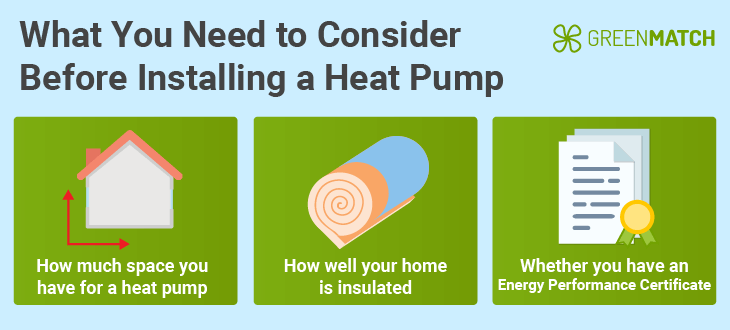
There are a few things you need to know before installing a heat pump for your home.
The first thing you need to consider is whether you have enough space for a heat pump. Ground source heat pumps, for instance, require quite a lot of space to be installed. Air source heat pumps also need enough room. However, you might be glad to hear that they primarily require outdoor space, as the indoor elements of heat pumps take up little space.
You will also need to make sure that your home is properly insulated before having a heat pump installed. Without the proper insulation, your heat pump will be working overtime to warm up or cool down your home, resulting in mounting energy costs. Additionally, if your home is poorly insulated, you may also find that you won’t be eligible for a heat pump grant.
Another element you’ll need to pay attention to before installing a heat pump for your home is the Energy Performance Certificate (EPC). This is required before contacting a heat pump installer, as it indicates that your home is energy-efficient and adequately insulated.
Once you’ve addressed these points, you’re ready to contact an installer and proceed with the heat pump installation process.
The verdict: What is the best choice for you?
If you were wondering: “Are heat pumps better than boilers?” then the short answer is yes. Installing heat pumps in flats in UK is the best option for heating and cooling purposes. This is especially true if you want to prioritise long-term savings and lowering your carbon footprint. Heat pumps are overall more efficient than gas boilers, can perform well for years to come, and have lower running costs and CO2 emissions.
That said, there are also some downsides to heat pumps, the main one being that they have a high cost. However, if you’re ready to invest in renewable energy, you’ll be able to reap the benefits of a heat pump for years to come. In addition, you can also check if you’re eligible for any of the grants for heat pumps available in the UK to potentially lessen the financial burden of installing this energy system.
If you’re still on the fence about installing a heat pump or if you’re ready for the next step in your renewable energy journey, then you’ll want to consult a heat pump installer. Not only can they offer you advice tailored to your situation, but they can also help you establish how much a heat pump would cost.
Instead of spending hours researching installers and conducting price comparisons, let us help you get the process of installing a new heat pump started in just 30 seconds. Simply fill in our short form and we’ll have up to 4 local heat pump installers reach out to you with quotes for their services.
This way, you can easily compare installers and prices to find the best fit for your home. Just click the button below and request free, no-obligation quotes now!
- Quotes from local engineers
- Payment by finance available
- Save £7,500 with BUS grant
It only takes 30 seconds



Frequently asked questions
Yes, it’s generally cheaper to run a heat pump than a gas boiler. That said, you will need to bear in mind that the exact annual running costs of a heat pump or a boiler vary significantly based on how efficient the system is.
If you’re looking to lower your annual heating bills and reduce your carbon footprint, then installing a heat pump instead of a boiler is worthwhile. Just make sure to consult a professional who can help you determine what the best energy solution for your home is.
A heat pump can cost anywhere from £8,400 to £19,000. You will also need to factor in installation costs. To ensure that you’re not overspending on replacing your gas boiler with a heat pump, you will want to find the installer with the lowest installation costs.
Virtually any house with enough space and proper insulation is suitable for a heat pump installation. However, there are some factors you need to consider before having a heat pump installed, to make sure that it’s the best energy system for your home.
Yes, a heat pump is more efficient than a heating system that runs on gas. Compared to gas-fuelled systems, heat pumps can produce up to 3 times more energy per unit of electricity they consume. This means that you can reduce both your electricity consumption and your carbon footprint with a heat pump.

Sabria Schouten is a content writer who aims to make information about sustainable energy broadly available. She believes that knowledge about how to lead a greener lifestyle should be easily accessible to anyone.
We strive to connect our customers with the right product and supplier. Would you like to be part of GreenMatch?

- Heat Pump VS Gas Boiler Comparison in the UK (2025)
- Gas boilers vs heat pumps
- The installation process compared
- Purchase costs compared
- Running costs compared
- Grants compared
- Performance compared
- Efficiency compared
- Dimensions compared
- Environmental impact compared
- Can I get a heat pump for my home?
- The verdict: What is the best choice for you?
- Frequently asked questions



